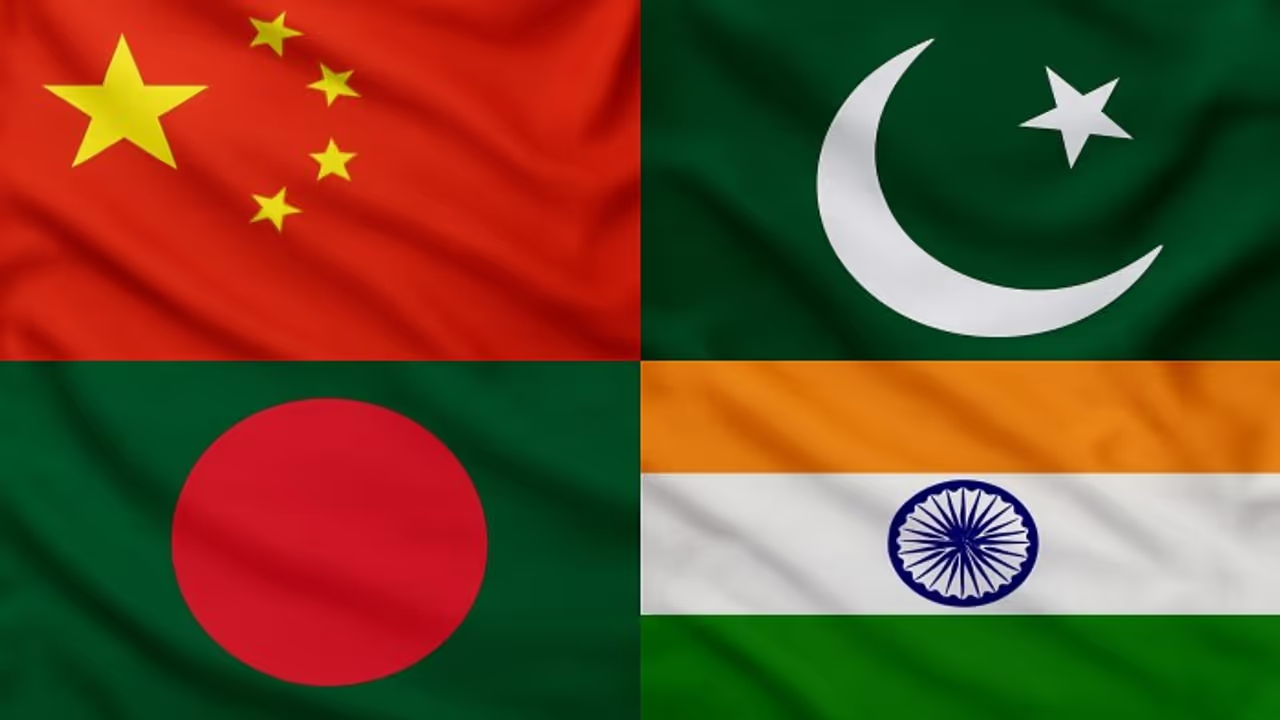China, Pakistan and Bangladesh have launched a trilateral cooperation mechanism to boost economic ties. Indian security experts warn it may evolve into a strategic triangle that threatens India’s dominance and security in the region.
New Delhi: A day ago, Bangladesh, China and Pakistan launched a trilateral cooperation mechanism to promote economic development and improve people's livelihoods.

In a meeting held in Kunming on June 19 in China, three sides emphasised that China-Bangladesh-Pakistan ties adhere to true multilateralism and open regionalism, not directed at any third party, according to the Chinese Ministry of Foreign Affairs.
Trilateral bloc, a concern for India
It is a well-known fact that China and Pakistan are all-weather friends but the joining of Bangladesh and forming a trilateral bloc is a cause of concern in Indian circles. About a year back, Dhaka used to be a good friend of Delhi since the country helped in their liberation from Pakistan. But things changed after the stepping down of the then Bangladesh prime minister Sheikh Hasina in August 2024.
Bangladesh is currently under the regime of an interim government headed by Nobel laureate Mohammad Yunus, appears more aligned with India's adversaries such as China and Pakistan.
Experts on the 'devil triangle'
Asianet Newsable English has spoken to a number of foreign and security affairs analysts to understand the developments taking place in India’s neighbourhood.
Calling it the devil triangle with potential to challenge India’s dominance in Bay of Bengal, Geostrategic and security experts Major General Sudhakar Jee said: “The triangle could choke Siliguri corridor and cut off northeast from the mainland of India and also sow seeds to balkanise India from both the continental borders and the IOR.”
“It will also present a two front threat permanently and strategise BRI (Border Road Initiative) to develop and secure access to warm waters in Bay of Bengal and Arabian Sea.”
Sudhakar Jee is also of the view that Beijing, Dhaka and Islamabad would try for intersection of “strategic encirclement” and “strategic triangle” to pressurise India to toe their demands.
Gautam Lahiri, an expert on Bangladesh affairs said: “It is disturbing news for India from a security point of view. The new dispensation is trying to become familiar with the old Pakistan and China. This triangle of Pakistan, Bangladesh, and China is yet to show its full impact.”
“They have said they will concentrate on economic issues, trade issues, etc. But the point is – in Pakistan and POK – the Chinese have been building CPEC (China Pakistan Economic Corridor) which is a major security concern for India. I think India should be alarmed and should take appropriate measures so that India’s security is not hampered,” Lahiri said.
Centre for Joint Warfare Studies (CENJOWS) director general Major General Ashok Kumar (Retd) said: “After the change of regime in Bangladesh, Dhaka has bandwagoned China and Pakistan. It is on its way to becoming East Pakistan. Not only this, Bangladesh has also been moving in the lap of China.”
“Now this three nation grouping appears to be getting stronger with each passing day. The alignment is primarily taking an anti-India shape.”
“It is hoped that Bangladesh may come out of this grouping if fair elections are conducted and some sensible government is formed. India has to use its diplomatic ingenuity to ensure that this grouping doesn't become stronger,” the CENJOWS DG added.
Former Bangladesh Army officer and diplomat Major General Shahidul Haq (Retd), who had also served as an ambassador to several countries, said: “These countries have already mentioned in their statements that it is not directed to any third country.
“Most of the Bangladeshis don't want any strategic or defence or military alignment with anybody. This was what everybody very strongly felt. I also read statements from all these three countries and found out that more economic and common social parameters are included in it,” Shahidul Haq said.
Subhashish Banerjee, Founder, P3 Think Tank, said: “It is now crystal clear that China is trying to take control of the Asian economic corridor, and thus, creating space for the Belt and Road Initiative is nothing but a primary thought process. This cannot be endorsed as an act of a mature power. It looks more like a self-centric approach than a collaboration.”
“Bangladesh and Pakistan's ruined economy has attracted obvious attention of the nations who are interested in establishing the sense of political control in the Asian market,” Subhashish Banerjee said.
“But considering the fact that India leads the consumer market of the world, any overambitious draft endorsed to sideline or isolate India's interest is nothing but an attempt of building a castle out of cards. China must understand that when the entire world is trying to create chairs for India as a power, creating nuisance just for the sake of seeking control may attract huge international criticism because Pakistan as a territory is already a proven terror enthusiast and Bangladesh is already in the state of destabilisation,” he added.
Operation Sindoor redraws China's outreach
In the aftermath of Operation Sindoor, India’s military operation against terrorist infrastructures in Pakistan, China has been trying to consolidate its position in the South Asian region and it could be a reason that Beijing is bringing together two of India’s immediate neighbours – Pakistan and Bangladesh under its fold. India and China had also engaged in border standoff in eastern Ladakh for around five years and the troops from both sides disengaged only last year in October.


